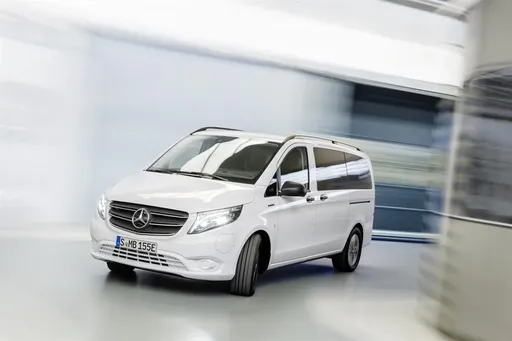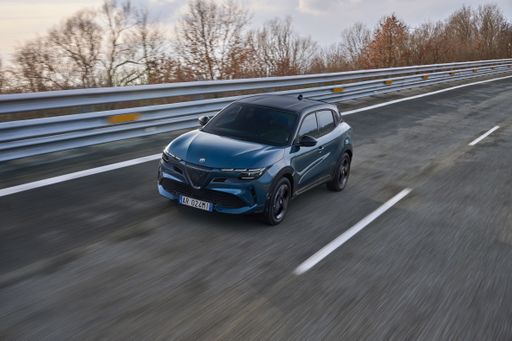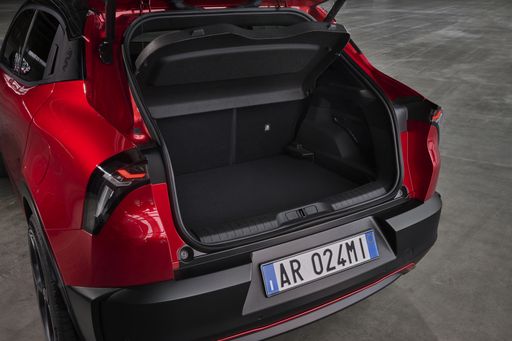Alfa Romeo Junior vs Mercedes Vito Bus – Performance, range & efficiency compared
Everyday use, family trips or long-distance drives – here’s where the differences show.
Discover whether Alfa Romeo Junior or Mercedes Vito Bus fits your lifestyle better.
Costs and Efficiency:
Price and efficiency are often the first things buyers look at. Here it becomes clear which model has the long-term edge – whether at the pump, the plug, or in purchase price.
Alfa Romeo Junior has a significantly advantage in terms of price – it starts at 25700 £, while the Mercedes Vito Bus costs 36300 £. That’s a price difference of around 10659 £.
Fuel consumption also shows a difference: Alfa Romeo Junior manages with 4.80 L and is therefore evident more efficient than the Mercedes Vito Bus with 6.70 L. The difference is about 1.90 L per 100 km.
In terms of energy consumption, the advantage goes to the Alfa Romeo Junior: with 15.10 kWh per 100 km, it’s significantly more efficient than the Mercedes Vito Bus with 26.70 kWh. That’s a difference of about 11.60 kWh.
As for range, the Alfa Romeo Junior performs hardly perceptible better – achieving up to 410 km, about 40 km more than the Mercedes Vito Bus.
Engine and Performance:
Power, torque and acceleration are the classic benchmarks for car enthusiasts – and here, some clear differences start to show.
When it comes to engine power, the Alfa Romeo Junior has a to a small extent edge – offering 280 HP compared to 237 HP. That’s roughly 43 HP more horsepower.
In terms of top speed, the Alfa Romeo Junior performs noticeable better – reaching 206 km/h, while the Mercedes Vito Bus tops out at 140 km/h. The difference is around 66 km/h.
There’s also a difference in torque: Mercedes Vito Bus pulls distinct stronger with 500 Nm compared to 345 Nm. That’s about 155 Nm difference.
Space and Everyday Use:
Whether family car or daily driver – which one offers more room, flexibility and comfort?
Seats: Mercedes Vito Bus offers evident more seating capacity – 8 vs 5.
In curb weight, Alfa Romeo Junior is significantly lighter – 1380 kg compared to 2023 kg. The difference is around 643 kg.
In terms of boot space, the Mercedes Vito Bus offers clearly more room – 1390 L compared to 415 L. That’s a difference of about 975 L.
In maximum load capacity, the Mercedes Vito Bus performs decisively better – up to 4990 L, which is about 3710 L more than the Alfa Romeo Junior.
When it comes to payload, Mercedes Vito Bus decisively takes the win – 1077 kg compared to 420 kg. That’s a difference of about 657 kg.
Who comes out on top?
Overall, the Mercedes Vito Bus shows itself to be leaves the rival little chance and secures the title of DriveDuel Champion.
It convinces with the more balanced overall package and proves to be the more versatile choice for everyday use.
 @ Mercedes-Benz Group Media
@ Mercedes-Benz Group Media
Mercedes Vito Bus
Alfa Romeo Junior
The Alfa Romeo Junior captures the essence of Italian design with its sleek lines and compact dimensions, making it an icon of elegance and performance. With a spirited driving experience and a charming retro aesthetic, it appeals to enthusiasts and casual drivers alike. This delightful car embodies the brand's rich heritage while remaining a fun and engaging option for those seeking a unique automotive experience.
details @ Alfa Romeo / Stellantis Media
@ Alfa Romeo / Stellantis Media
 @ Alfa Romeo / Stellantis Media
@ Alfa Romeo / Stellantis Media
 @ Alfa Romeo / Stellantis Media
@ Alfa Romeo / Stellantis Media
Mercedes Vito Bus
The Mercedes-Benz Vito Bus offers a versatile solution for those in need of spacious and comfortable group transportation. Its refined interior is designed to enhance passenger comfort, making it ideal for both business and leisure travel. With a focus on safety and efficiency, it provides a reliable driving experience that aligns with the high standards expected of the Mercedes-Benz brand.
details @ Mercedes-Benz Group Media
@ Mercedes-Benz Group Media
 @ Alfa Romeo / Stellantis Media
@ Alfa Romeo / Stellantis Media
|
 @ Mercedes-Benz Group Media
@ Mercedes-Benz Group Media
|
|
|
|
Costs and Consumption |
|
|---|---|
|
Price
25700 - 41600 £
|
Price
36300 - 55900 £
|
|
Consumption L/100km
4.8 - 5.4 L
|
Consumption L/100km
6.7 - 10 L
|
|
Consumption kWh/100km
15.1 - 17.5 kWh
|
Consumption kWh/100km
26.7 - 26.9 kWh
|
|
Electric Range
344 - 410 km
|
Electric Range
248 - 370 km
|
|
Battery Capacity
0.4 - 51 kWh
|
Battery Capacity
60 - 90 kWh
|
|
co2
0 - 119 g/km
|
co2
0 - 228 g/km
|
|
Fuel tank capacity
44 - 45 L
|
Fuel tank capacity
57 - 70 L
|
Dimensions and Body |
|
|---|---|
|
Body Type
SUV
|
Body Type
Bus
|
|
Seats
5
|
Seats
8
|
|
Doors
5
|
Doors
4
|
|
Curb weight
1380 - 1689 kg
|
Curb weight
2023 - 2739 kg
|
|
Trunk capacity
340 - 415 L
|
Trunk capacity
580 - 1390 L
|
|
Length
4173 mm
|
Length
4895 - 5370 mm
|
|
Width
1781 mm
|
Width
1928 mm
|
|
Height
1505 - 1538 mm
|
Height
1890 mm
|
|
Max trunk capacity
1205 - 1280 L
|
Max trunk capacity
4190 - 4990 L
|
|
Payload
390 - 420 kg
|
Payload
726 - 1077 kg
|
Engine and Performance |
|
|---|---|
|
Engine Type
Electric, Petrol MHEV
|
Engine Type
Diesel, Electric, Petrol
|
|
Transmission
Automatic
|
Transmission
Automatic
|
|
Transmission Detail
Dual-Clutch Automatic, Reduction Gearbox
|
Transmission Detail
Automatic Gearbox, Reduction Gearbox
|
|
Drive Type
Front-Wheel Drive, All-Wheel Drive
|
Drive Type
Rear-Wheel Drive, All-Wheel Drive, Front-Wheel Drive
|
|
Power HP
136 - 280 HP
|
Power HP
136 - 237 HP
|
|
Acceleration 0-100km/h
5.9 - 9.1 s
|
Acceleration 0-100km/h
-
|
|
Max Speed
150 - 206 km/h
|
Max Speed
140 km/h
|
|
Torque
230 - 345 Nm
|
Torque
330 - 500 Nm
|
|
Number of Cylinders
3
|
Number of Cylinders
4
|
|
Power kW
100 - 207 kW
|
Power kW
100 - 174 kW
|
|
Engine capacity
1199 cm3
|
Engine capacity
1950 - 1999 cm3
|
General |
|
|---|---|
|
Model Year
2024 - 2025
|
Model Year
2024
|
|
CO2 Efficiency Class
A, C, D
|
CO2 Efficiency Class
G, A
|
|
Brand
Alfa Romeo
|
Brand
Mercedes-Benz
|
What drive types are available for the Alfa Romeo Junior?
Available configurations include Front-Wheel Drive or All-Wheel Drive.
The prices and data displayed are estimates based on German list prices and may vary by country. This information is not legally binding.
